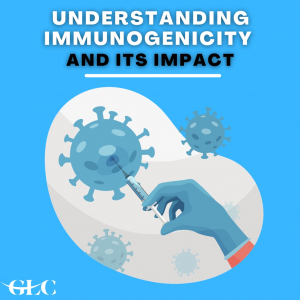Free knowledge to monitor the world of events. Have a look at our must read Blogs on Pharma, Finance, HR, Health and Cross Industry.
Understanding Immunogenicity and Its Impact
2022-08-16
The term "immunogenicity" describes a substance's capacity to trigger an immune response in humans;
Introduction
Scientists have worked hard to create effective therapies for a wide range of illnesses in the realm of medical research. An important field of study that is vital to the development and evaluation of biologics and vaccines is the study of immunogenicity. To optimize treatment effectiveness and guarantee patient safety, a full understanding of immunogenicity is necessary. The idea of immunogenicity and its crucial role in the creation and distribution of medicines, biologics, and vaccines is the main topic of this blog.

What is Immunogenicity?
The term "immunogenicity" describes a substance's capacity to trigger an immune response in humans; this includes biological medications and vaccines. The human body's immune system quickly identifies an antigen as foreign and launches a defensive response to eliminate or neutralize it.
The Immune Response
The interplay between the innate and adaptive immune systems makes up the intricate mechanism known as the immunological response. While the adaptive immune system mounts a focused, antigen-specific defense, the innate immune system serves as the first line of defense.
Antigenicity vs. Immunogenicity
It is imperative to establish a clear distinction between the concepts of immunogenicity and antigenicity. On the other hand, immunogenicity denotes a substance's capacity to elicit an immune response, whereas antigenicity refers to a substance's propensity to attach only to particular antibodies or receptors. It is important to recognize that while not all substances can elicit an immune response, all of them are considered antigens since they can do so.
Immunogenicity in Vaccine Development
Vaccines play a vital role in the prevention of infectious diseases by inducing an immunological response that enhances the immune system's ability to identify germs and mount a successful defense against them. Evaluation of immunogenicity is an important stage in the development of vaccines since it makes it easier to evaluate the safety and effectiveness of the shots.
Measuring Immunogenicity in Vaccines
An examination of the immunological response that a specific vaccination elicits is necessary for the assessment of immunogenicity. This includes measuring the number of antibodies produced, especially neutralizing antibodies that can attach to the virus and destroy it. T-cell responses, which serve to activate more immune cells and directly destroy infected cells, are also examined as part of the evaluation.
Challenges in Immunogenicity Assessment
When assessing immunogenicity in the context of vaccine development, a multitude of challenges arise. Determining the parameters that define an effective immune response could present difficulties, especially when considering emerging viruses like SARS-CoV-2. Scholars rely on previous research and pre-existing knowledge regarding comparable viruses to guide and mold their understanding.
In addition, it is critical to establish standardized assays to guarantee the precision and comparability of immunogenicity data. The task of determining analogous reference values for a protective immune response is difficult to accomplish because diverse testing procedures are employed worldwide. Presently, there exists a significant effort to harmonize testing methodologies and institute globally accepted standards.
Immunogenicity in Biologics
Biologics comprise a class of therapeutic substances derived from living organisms, such as recombinant proteins and monoclonal antibodies. The assessment of immunogenicity is a critical factor in the advancement and application of biologics, given its capacity to impact their safety and efficacy.
Understanding Anti-Drug Antibodies (ADAs)
A central concern within the domain of biologics pertains to the development of anti-drug antibodies (ADAs) in patients. ADAs, which are antibody-mediated immune responses, are generated in response to the therapeutic protein. The existence of these antibodies may render the medication ineffective, reduce its effectiveness, or provoke adverse reactions.
Factors Affecting Immunogenicity in Biologics
There are numerous factors that can affect the immunogenicity of biologics. Inherent properties, molecular structure, and dynamic interaction with the immune system all contribute to the cumulative effect of the protein. Immunogenicity may also be affected by factors associated with the patient, such as genetic variations and pre-existing medical conditions.
Immunogenicity Risk Assessment and Monitoring
In order to mitigate potential concerns regarding immunogenicity, biopharmaceutical companies conduct comprehensive risk assessments at every stage of the drug development process. This procedure entails the evaluation of numerous parameters, such as the protein's structure and sequencing, in addition to its potential immune system interactions. Ensuring patient safety during clinical trials and post-marketing surveillance is contingent upon the meticulous monitoring of immunogenicity.
Overcoming Challenges in Immunogenicity
Challenges arise in the development and application of biologics and vaccines due to the property of being immunogenic. Ongoing scientific endeavors are devoted to overcoming these challenges and improving the efficacy of treatment outcomes.
Predicting and Minimizing Immunogenicity
Presently, significant efforts are being devoted to the development of predictive models and technologies capable of assessing the immunogenicity of vaccines and biologics. By modifying the design and composition of therapeutic products, researchers can reduce the risk associated with them by conducting an exhaustive investigation of the components that contribute to immunogenicity.
Enhancing Immune Tolerance
Increasing immunological tolerance is another strategy for reducing immunogenicity. To lessen the immune system's response to the therapeutic protein, the process entails immune system regulation. Current studies are looking into a number of strategies, including co-administration of immunomodulatory drugs and protein modification to increase toleration-inducing potential.
Advancing Immunogenicity Testing Methods
Enhancing the precision and dependability of immunogenicity testing techniques is crucial for increased monitoring and assessment. Establishing reference materials, creating standardized tests, and encouraging collaboration between researchers and regulatory agencies are all necessary for the area to advance.
Immunogenicity is a crucial concept in many real-world settings, such as biotechnology, medicine, and vaccines, where its importance is especially clear. Several cases have been found that highlight the significance of immunogenicity.
- Vaccine Development:
Pfizer-BioNTech, Johnson & Johnson, Moderna, and other companies have developed COVID-19 vaccines, demonstrating the significance of comprehending immunogenicity. The capacity of these vaccines to produce a potent immune response while lowering the frequency of side effects is essential to their effectiveness and success. - Biologics and Therapeutic Proteins:
Anti-drug antibodies (ADAs) may develop in a subgroup of patients receiving therapeutic procedures employing therapeutic proteins (e.g., monoclonal antibodies). It is impossible to ignore the possible influence of the immune response on the effectiveness and safety of the treatment. Regarding multiple sclerosis, it has been observed that individuals undergoing interferon-beta therapy can acquire neutralizing antibodies, which would decrease the medication's therapeutic effectiveness. - Immunogenicity in Organ Transplants:
Immunosuppressive medications are routinely given to organ transplant recipients in an effort to lower the risk of rejection. The immunogenicity of the transplanted organ and the potential for graft-versus-host disease, however, continue to raise serious concerns. Comprehending and managing immunogenicity well are essential factors for achieving successful outcomes in the organ transplantation domain. - Allergic Reactions to Therapeutics:
Because of their immunogenic qualities, certain situations exist where the use of medicinal substances or pharmaceuticals may result in hypersensitive reactions. For example, certain people may experience adverse reactions to the ingredients in medications or immunizations. This emphasizes how important it is to evaluate and effectively reduce the risks associated with immunogenicity. - Autoimmune Diseases:
The mistaken diagnosis and subsequent immune system attack on the body's tissues characterize autoimmune illnesses, such as rheumatoid arthritis. When creating biological drugs used to treat various diseases, much thought must be paid to minimizing immunogenicity because the development of anti-drug antibodies may jeopardize the treatment's effectiveness. - Blood Transfusions:
Blood transfusions require that compatibility between the recipient's immune system and the donor's blood be established to prevent immunological responses. It is imperative to carefully evaluate immunogenicity to maintain the efficacy and safety of blood transfusions.
Comprehending immunogenicity and effectively managing it are persistent issues in many medical contexts and similar situations. To further increase safety and efficacy, scientists and medical experts are always working to expand our understanding of how the immune system reacts to different medications and interventions.
Conclusion
The notion of immunogenicity is of considerable significance in the intricate domain of biologics and vaccines, functioning as a critical component that necessitates meticulous assessment and consideration throughout their formulation and assessment procedures. The efficacy and safety of these therapeutic strategies are contingent upon their ability to elicit a robust immune response while concurrently mitigating adverse reactions. In the realm of vaccines, specifically those intended to combat contagious diseases like COVID-19, the principal aim is to stimulate an immune response that confers protection against the particular pathogen under consideration. An alternative perspective states that in the field of biologics, which includes therapeutic proteins like monoclonal antibodies, it is critical to understand and control immunogenicity. Antibodies against drugs (ADAs) that develop in patients undergoing biologic therapy may compromise the efficacy of these courses of treatment. Hence, a comprehensive comprehension of the complexities surrounding immunogenicity is imperative to optimize the effectiveness of biologics and vaccines, thus ensuring the well-being and health of individuals.
Researchers in the field of immunogenicity are perpetually innovating to enhance therapeutic outcomes. Presently, scientific investigations are focused on improving the approaches utilized in immunogenicity testing, to attain a more holistic understanding of the immune system's response to these therapeutic interventions. The primary objective of research and development is to enhance our ability to predict, assess, and mitigate immunogenic responses. Constant technological and methodological progress enables the healthcare community to gain substantial insights into the myriad of factors that influence immunogenicity. This understanding empowers members of the community to augment and refine therapeutic protocols. The ongoing partnership between scientific progress and clinical implementation presents an opportunity to improve the effectiveness of biologics and vaccines, while also ensuring patient safety in the evolving fields of immunotherapy and preventive medicine.
Join our upcoming Masterclass in Immunogenicity conducted by industry expert.
By Sasly Ahmeth, Social Media Executive & IT Support, GLC Europe, Colombo Office, Sri Lanka.
Get a feel for our events

Training Program for CMC Leaders - EU edition
14th September 2026 - 09th April 2027
Rich with practical insights and real-world applications
learn more >>
Training Program for CMC Leaders - US edition
14th September 2026 - 09th April 2027
Rich with practical insights and real-world applications
learn more >>
Advanced Stability Testing of Pharmaceuticals MasterClass - US edition
24-27 February, 2026
Increase the likelihood of studies receiving regulatory approval
learn more >>












